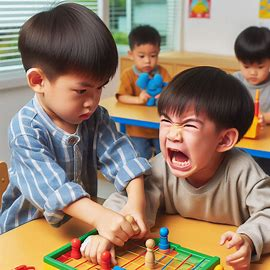Has your child’s behaviour suddenly changed? Are they lashing out at other children? If so, you’re not alone. Many parents find themselves asking these questions, and we’re here to help.
Preschoolers are curious, easily distracted, and keen on independence. They’re still developing self-regulation, which can lead to changes in behaviour. Here are some common reasons:
Basic Needs
Preschoolers may exhibit changes in behaviour due to basic needs. When hungry, they can become irritable or fussy. Tiredness and lack of sleep affects mood and behaviour. Discomfort from illness can commonly impact and be related to a change in behaviour.
Developmental Phase
- Saying “No”: As they become more independent, preschoolers may develop an affinity for saying “no.”
- Tantrums: Occasional tantrums are typical, but they should be gaining better control over emotions and impulses.
Internal feelings and Sensations
- Fear and Worry: Fear of separation, new situations, or unfamiliar people can affect behaviour. Worries about monsters, darkness, or imaginary scenarios may lead to clinginess or sleep disturbances.
- Anger and Frustration: Preschoolers have limited emotional regulation. When they feel frustrated or unable to express themselves, they may exhibit tantrums, hitting, or yelling.
- Sensory Overwhelm: Overstimulation from bright lights, loud noises, or crowded environments can cause meltdowns or withdrawal
Environmental
- Group Settings: Demands and Expectations: In group settings (like preschool), children face increased demands. They learn to follow instructions, wait their turn, share toys, and participate in group activities.
- Social Skills: Interacting with peers helps develop social skills, but it can also lead to conflicts or frustration.
Trauma
- Preschoolers suffering from traumatic stress symptoms may exhibit difficulty regulating their behaviours and emotions. They might become clingy, fearful of new situations, easily frightened, and occasionally aggressive or impulsive
Remember, patience and understanding go a long way in guiding preschooler behaviour!
Let’s explore the story of Noah, a preschooler from the vibrant bayside town of Glenelg, to understand this better.
Noah’s Story
Noah, like any other child his age, was full of life and always ready for the next adventure. But his parents noticed a change in his behaviour. He started lashing out at other children, something he had never done before.
Noah was learning to navigate social situations, like sharing his favourite toys, waiting for his turn on the swing, and following his friends’ ideas during playtime. He was also grappling with the disappointment of leaving his play when it was time for kindergarten, or not being able to have his favourite takeaway before dinner. He was trying to understand how to join in with the group, dealing with the frustration of coming second in a game, and struggling to follow instructions and sequence routine tasks.
His parents understood that Noah was going through a phase of emotional dysregulation, where he was expressing his feelings of being upset, disappointed, frustrated, bored, irritated, or overwhelmed in hurtful ways towards others or himself. They knew they had to help Noah navigate these emotional waters.
Strategies for Parents
Here are a few strategies that Noah’s parents, and many others, have found helpful:
- Redirection: Redirect your child’s attention to a different activity or toy when they start to show aggressive behaviour.
- Positive Reinforcement: Praise and reinforce positive behaviours, like sharing toys or interacting kindly with others.
- Emotional Coaching: Help your child recognise and express their emotions. For example, “It’s okay to feel frustrated, but hitting others isn’t the right way to express it.”
- Empathy: Show empathy towards your child and the other children involved, acknowledging their feelings and helping them find alternative ways to express themselves.
- Logical Consequences: Allow your child to experience the natural outcomes of their actions, like not having a toy for a while if they snatched it from another child.
- Problem-Solving: Involve your child in problem-solving. Ask questions like, “What could you do differently next time?” or “How can we solve this problem together?”
- Managing Internal States
- Validation: Acknowledge their feelings (“I see you’re upset”) to help them feel understood.
- Comfort: Provide a safe space and soothing activities (e.g., cuddling, deep breathing).
- Predictability: Consistent routines and clear expectations reduce anxiety.
- Managing Group Dynamics:
- Patience: Encourage patience during group activities.
- Modelling: Demonstrate sharing, turn-taking, and cooperation.
- Predictability: Consistent routines help children adapt to group expectations.
Through gentle parenting, Noah’s parents helped him develop better social skills and emotional intelligence. And as Noah grew, he learned to navigate his world with more kindness and understanding.
Remember, every child is unique and learns at their own pace. As parents, our role is to guide them through their journey with love, patience, and understanding.
How Occupational Therapy Can Help
If your child is facing challenges with emotional regulation, sensory processing, or fine motor skills, consider reaching out to an Occupational Therapist (OT). OTs are skilled professionals who specialise in child development and can provide:
- Expert Guidance: They understand the unique needs of each child and can provide tailored solutions.
- Playful Learning: Through play-based activities, children learn while having fun. OT integrates learning seamlessly into their daily routines.
- Holistic Approach: OT considers the whole child—physical, cognitive, emotional, and social aspects.
To take action, observe any signs of struggle, consult with a professional OT, and collaborate with the therapist. Remember, early intervention makes a world of difference. Let’s empower our children to thrive!
If you are considering occupational therapy for your child and family, consider booking an appointment with one of our paediatric occupational therapists at Adelaide Night and Day Family Therapy. Visit our website for more information.
Other links- Parenting SA
Some other resources Parenting SA: Toddlers and Big Feelings



